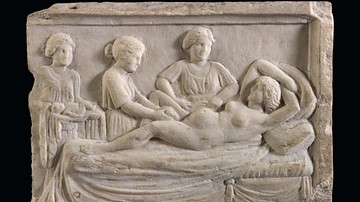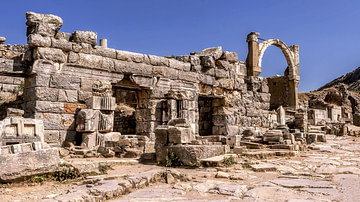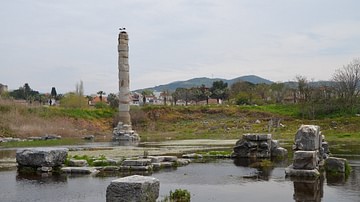Search
Remove Ads
Advertisement
Summary 
Loading AI-generated summary based on World History Encyclopedia articles ...
Search Results

Article
Childbirth in Ancient Rome
Childbirth in ancient Rome was considered the main purpose of marriage. Roman girls married in their early teens, and in elite society, some married before they reached puberty. The legal age for marriage was 12 for a girl; 15 was accepted...

Definition
Ephesus
According legend, Ephesus (also Ephesos) was founded by the tribe of the Amazons, great female warriors. The name of the city is thought to have been derived from "Apasas", the name of a city in the "Kingdom of Arzawa" meaning the "city of...

Image
Positions of the Embryo in the Uterus in Soranus of Ephesus' Gynaecology
A Latin version of Gynaecology by Soranus of Ephesus, showing positions of the embryo in the uterus.
Codex 3714, fol. 28r.
Bibliothèque Royale, Brussels.

Definition
Temple of Artemis at Ephesus
The Temple of Artemis at Ephesus was located on the western coast of Asia Minor (modern Turkey) and built in the 6th century BCE. Such was its tremendous size, double the dimensions of other Greek temples including the Parthenon, that it...

Definition
Heraclitus of Ephesus
Heraclitus of Ephesus (l. c. 500 BCE) was one of the early Pre-Socratic philosophers who, like the others, sought to identify the First Cause for the creation of the world. He rejected earlier theories such as air and water and claimed that...

Definition
Hippocrates
Hippocrates was born on the Greek island of Kos in the 5th century BCE, and he became the most famous physician in antiquity. He established a medical school on the island, wrote many treatises on medical matters, and is, through his systematic...

Definition
Silphium
Silphium (also known as laser) was an uncultivated plant that grew in Cyrene, North Africa (modern Shahhat, Libya) and became the cash crop of the region of Cyrenaica between c. 631 BCE and the 1st century CE when, according to Pliny the...

Definition
Library of Celsus
The Library of Celsus in ancient Ephesus, located in western Turkey, was a repository of over 12,000 scrolls and one of the most impressive buildings in the Roman Empire. Constructed in the 2nd century CE, it was named after the city's former...

Article
Roman Girls and Marriage in Ancient Rome
In ancient Rome, the legally acceptable age for marriage for girls was twelve. Although in middle-class Roman society, the most common age of first marriage for a girl was mid-to-late teens, evidence also shows that in a section of elite...

Image
Temple of Artemis, Ephesus
The lonely reconstructed column standing on the site of the Temple of Artemis at Ephesus. The Temple of Artemis, also known as the Artemesium, was constructed in the mid 6th century BCE and was considered to be one of the Seven Wonders of...